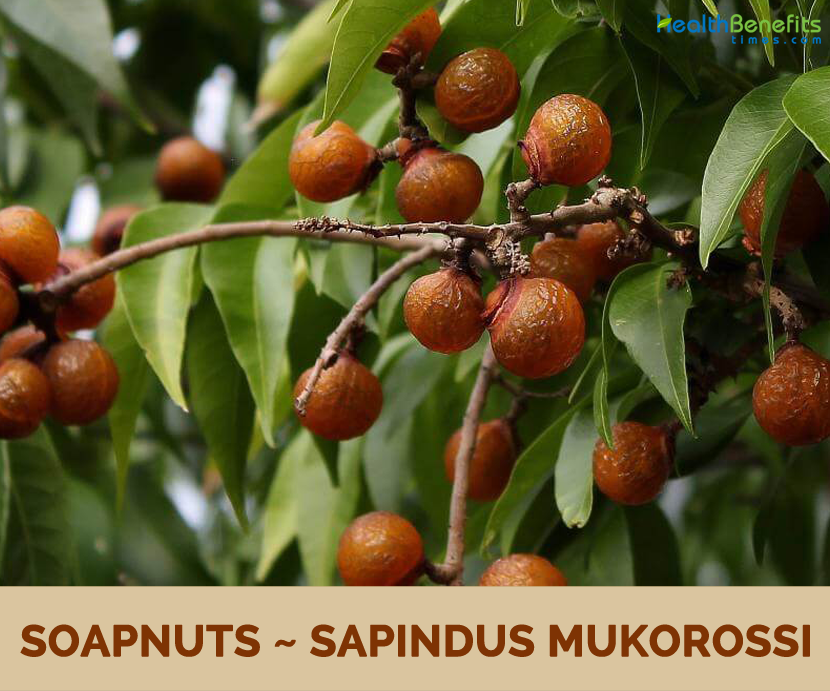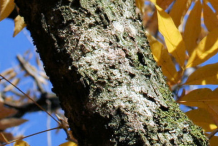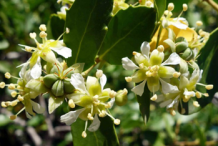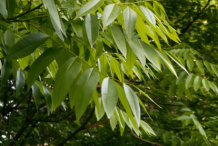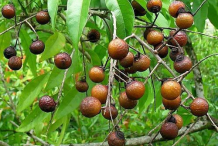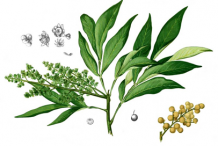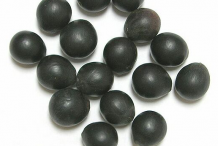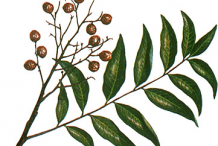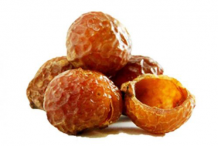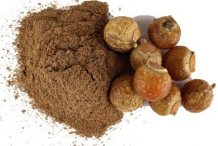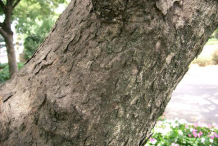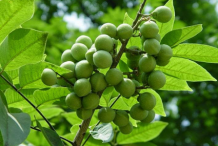Soap nuts are not actually nuts (nor are they related to nuts in any way!). They are actually a macadamia-sized berry which is split open and dried in the sun, producing a dark golden ‘shell’. These shells (known as ‘soap nuts’) contain a very high percentage of saponins, a surfactant which removes dirt and oils from clothing when contacted with water. Soap nuts are versatile and can substitute many conventional detergents, soaps, and cleaners. Despite their name, soap nuts are in fact a fruit and won’t cause nut allergies.
Plant Description
Soap nuts are fast-growing medium sized tropical deciduous tree that grows about 25 m (82 ft.) tall and has circumference of 3 to 5 m (9-16 ft.). Since the plant is mostly found in Temperate and tropical regions of India and Nepal. It is found growing on the edges of the forests, in the canyons, prairies, ravines, and along the creeks, streams and rivers. It prefers a deep, fertile, moist soil, but plants are very tolerant of a wide range of soils, including those that are dry, stony or nutrient deficient. Trunk is straight, cylindrical, and can be up to 60 cm in diameter with grayish-brown scaly or slightly furrowed bark and yellow wood.
Leaves
Leaves of the Soapberry tree are alternate, pinnately compound, dense and fibrous, and they are deciduous. Leaves appear medium-green in color during summer and change to a gorgeous yellow color during the fall. Length of the leaves ranges from 8 inches to 15 inches (20.3 to 38.1 cm), and they are composed of 6 to 20 slender lanceolate leaflets with soft borders, elongated, tapered tips, and irregular wedge-shaped bottoms, with the length, ranging from 2 inches to 5 inches (5 to 12.7 cm) and the breadth between 3/4 inches to 1 1/2 inches.
Flower
Soapberry tree produces flowers from May to June. The flowers are small and greenish white, with the length, ranging from 6 inches to 10 inches (15.2 to 25.4 cm), polygamous and mostly bisexual in terminal thyrses or compound cymose panicles. These are sub-sessile; numerous in number and at times occur in lose panicles at the end of branches.
Fruit
The fruit of the Soapberry tree comes in big pyramidal groups at the ends of its branches, and they look like a cherry. They are solitary globose, round nuts 2 to 2.5 cm (1 in) diameter, fleshy, saponaceous, smooth transparent yellowish, berry-like drupe. They turn out to be transparent and wrinkled when they are fully grown. The fruit of the Soapberry tree includes a single black colored seed, with a diameter of 3/8 inches (.89 cm). One reetha tree can produce 30–35 kg of fruit per year.
The fruit is collected during winter months for seed and or sale in the market as soap nut. Dried fruit is most valuable part of the plant. Its fleshy portion consists of saponin, which is actually a good replacement for washing soap and is also used in making quality shampoos, detergents, etc. In fact the skin of the fruit is extremely appreciated by the rural folks as a natural produced shampoo for washing their hair. They also use these for cleaning woolen clothes.
Types/Varieties
There are two species of sapindus trees found. Following is the list of both ones.
Sapindus mukurossi
These are actually wild trees, found in Himalayan regions at the heights of 4000 ft., but in North India, Assam etc., its cultivated trees are found in the gardens, parks and near the villages.
Sapindus trifoliatus
These trees are particularly found in Southern India. Its fruit grow in groups of 3 fruit each. Fruits are kidney shaped and when separated, the joined part makes a heart shaped sign. When ripe, fruits become slightly reddish brown in color.
Health benefits of Soapnuts
Soapnuts (Reetha) has many health benefits and the mostly used part of this natural herb is fruit. Soapnut fruit is very advantageous for hair and main ingredient of many hair shampoo and conditioners. Dosage of 3-6 gm. Reetha Soapnut is enough. Some main relevant health benefits or uses of Soapnut (Reetha) are as mentioned below:
1. Prevents many skin related Diseases
Being a 100% natural, washing your skin frequently with soap nuts can help in preventing many diseases. Although, in comparison, the chemicals in other detergents are absorbed through the skin and also into the blood stream, giving way to plenty of skin diseases. It is quite skin friendly and does not affect the skin.
2. Helps in preventing bad habits
Soapnuts are even given to regular smokers, as they help in giving them less craving for tobacco and related products. This product is also used to treat migraine and extra salivation problems.
3. Heals Psoriasis and Eczema
Ayurveda has ranked soapnut highly in its lists of popular herbs as well as minerals. Moreover, this herb is used for treating a number of skin problems like psoriasis, eczema and also to remove freckles. In addition to this, soapnuts also possesses mild insecticidal attributes.
4. Treats Asthma
Soapnuts are available in various forms and one of it form can help to cure the problem of asthma. It is very important to use this herb for curing asthma. There are various other sources to cure this issue, but soapnuts can prove worth in the process.
5. Stops hair fall
Almost everyone is aware of the benefits of soap nuts for hair. In fact there are numerous shampoos that are enriched with soapnuts. This is a traditional method which importantly reduces the falling of hair. They are also very much useful for the treatment of lice in the scalp.
6. Tumor Cells
The generation of tumor cells in the body can be reduced by exact use of soapnuts. It has some best kinds of properties that will reduce the chance of getting tumor cells in any part of the body. It increases its importance for medical science.
7. Smooth blood circulation
Smooth circulation of blood throughout the body will make the body healthy. One of them is the head. Using soap nut for hair will make your blood circulation smooth. So the head will get enough oxygen and nutrients. Your hair will become healthier.
8. Prevents Dandruff
Soapnut helps to reduce Dandruff and white flakes because of its hair cleansing properties. Put the liquid over your scalp and keep it for several minutes and then clean your scalp with fresh water.
9. Hysteria
People suffering badly from the problem of hysteria can be cured by proper use of soapnuts. Use some of these soapnuts to prepare a thick solution and use it as per the requirement to reduce the effect of hysteria.
10. Fight against Skin and Scalp infections
Soapnuts consists of certain insecticides that help in killing the lice from scalp. Powdered reetha is known to fight off various problems affecting the scalp, including dandruff. If soapnuts are used regularly on skin, then it can help in treating diseases like eczema, dandruff and psoriasis etc.
11. Face Wash
People who want to stay away from face wash containing chemicals should use natural products such as soapnuts. Regular use of this natural product can help to get proper results. The liquid from the soapnut can be applied on the skin in the form of face wash.
12. Treats Hair Split Ends
Split ends can also lead to loss of hair as it needs proper steps on time. Use of soapnuts can become the anticipated step to get rid of split ends problem. It will be better to use soapnuts instead of any chemical products available in the market.
13. Anti-Venom
Use of soapnuts can be for in terms of anti-venom. If you are badly suffering from bite from snakes or scorpion, soapnuts can be used to bring out the venom. It has natural source of these properties that makes it perfect to cure venom issues.
Traditional uses and benefits of Soapnuts (Reetha)
- Plant is used in the treatment of epilepsy, burns, head lice, dental problems, etc.
- Fruit and seeds are considered as a cure for epilepsy in northern India.
- Decoction of the fruit is used as an expectorant.
- Lather of the fruit is used to treat burns.
- Seeds are used to stop dental caries in China.
- Fruit is considered to be hemolytic.
- It is used for treating skin diseases and psychiatric disorders.
- Roots are used for hemicranias and epilepsy.
- Fruits are bitter and astringent are emetic, abortifacient, expectorant and anthelmintic.
- Its powder is used externally to treat boils, scorpion bite and itching lesions.
- Native Americans used poultices made of sap of soapberry tree to soothe the wounds.
- Soapberry can also be used in treatment of fever, rheumatism and kidney disorders.
- You can use reetha liquid to cure diaper rashes in babies. But, make sure you do a patch test before applying it to the affected area.
- Soapnuts also display insecticidal properties that help in killing lice on the scalp.
- Soapnuts are very effective in helping to cure tobacco and drug addiction.
- It has also been found to relieve severe bouts of migraines.
- Powdered reetha can help cure excess salivation.
- Drinking reetha juice can help control your cholesterol levels.
- Reetha can help you getting instant relief from diarrhea, verminosis, and dyspepsia.
- Reetha water is known to be a good treatment for sore eyes.
- Due to its anti-allergic and antibacterial nature, it can be used in hand washes.
Ayurvedic Health benefits of Soapnuts (Reetha)
- Skin: Take dried soapnuts. Boil it in water. Apply lukewarm on the affected part. OR Powder some dried soapnuts. Add water to make a thin paste. Keep till it becomes thick. Apply on the affected part for half an hour twice a day.
- Dandruff: Soak soapnuts in water for a night. Crush them in the same water in the morning. Wash your hair and scalp with it once a week.
- Baldness: Add 1 to 2 tsp soapnuts powder in a glass of water. Stir it well. Wash your scalp with this water to promote hair growth.
- Grey Hair: Soak Indian Gooseberry, soapnuts seeds and pods of Acacia concinna in 3 cups of water for a night. Grind it. Use it as shampoo.
- Baldness: Soak 5 to 6 soapnuts in one glass of water at night. Next morning mash the materials and strain. Wash hair with this water. After do this- Rinse hair with Azadirachta Indica (Neem) decoction. This formula prevents hair fall and dandruff also.
- Baldness: Soak Roselle leaves and soapnuts overnight. Grind them in the morning. Apply it on your scalp. Wash after 5 hours.
- Migraine: Grind Soapnut along with 1-2 pepper grains adding some drops of water and smell it by pouring 4-5 drops in the nose. Migraines are relieved by snorting this nasal powder.
- Eye disease: In the case cataract make Reetha boil in water and take some drops and keep the water under the eyelids for benefit.
- Diseases of teeth: Take seeds of reetha. Fry them on pan. Grind them and add to it alum in the same quantity. Apply it on the teeth to massage. Every kind of dental disease goes away.
- Epilepsy: Take Reetha. Paste it finely along with the seed by adding 2-3 drops of water. Put the paste to smell below the nose of the patient who is unconscious. Soon he gains consciousness. OR Take Reetha 1 gram, 2-3 grams Trikatu choorna in 50 grams of water. Take the surficial water in a separate bottle in the morning. And take 4-5 drops through the nose early in the morning every day without taking any food. If it is done regularly all kapha (phlegm) related problems will be ousted. Nostrils are set free. Also helps in headache.
- To black hair:
- 100 grams Kapoor Kacharie, 100 grams Nagarmotha and camphor and reetha outer part 40-40 grams and Shikakaai 250 grams, 200 grams Amla. Make powder of them and prepare paste 50 grams of the powder by mixing the water to it. Apply the paste on the hair and wash hair with warm water. This makes hairs soft and gets rid of lices.
- Take the powders of Reetha, Amla, Shikakai – Wash the hair with these powders for silky, bright and thick hairs.
- Asthma:
- Take reetha fruit and paste it and smell. It is very beneficiary for the patient.
- Take the soapnut along with black pepper, grind it. If this essence is taken through nose 5-6 drops ailment is curable.
- Bleeding Hemorrhoids: Fry the outer portion of fruit minus its seeds on a pan till it turns black like coal. Then take the same size of catechu, mix it and sieve it. Take 125 ml. every day in the morning and evening also with butter or cream for 7 days.
- Diarrhea: Take 4 ½ grams of Reetha outer part. Boil it in the water and give it to the patient.
- Burning and Pain in Urination: Soak 25 grams of Reetha in a liter of water overnight. Take the surficial water in the morning for benefit.
- Amenorrhea: Problem regarding menstrual cycle can be cured by this. Take outer part of Reetha. Paste it and pour some drops of honey on it. Prepare it like a wick and put it in vagina. Menstruation starts soon.
- Delivery: Soak some cotton in the foam of reetha and put in vagina for easy delivery.
- Pains: Take 250 ml Reetha powder and have it with water or juice for relief.
- Semen growth: Paste the kernel of reetha. Add Jaggery to it and take it with a cup of milk in the morning – evening to increase the semen.
- Poison: Allow soapnut boil for a few minutes and take it inside. The poison comes out immediately.
- Opium poison: Let soapnut boils for quite some time. when it fumes, take a half cup of essence . It destructs Opium- poison.
- Scorpion’s poison:
- If soapnut powder is smoked like a ‘hukka pipe’ the poison of scorpion proves ineffective.
- Paste reetha outer part and add it to jaggery in the same quantity. Make the 1-2 grams tablets. Take them for five minutes with water. Take three tablets within 15 minutes. The poison of scorpion vanishes.
- Paste reetha and anoint eyes mixing some water drops and rub it on the place of where the scorpion bites. Then the poison would be destructed.
- Poisonous bites: Soapnut should be rubbed in the vinegar and apply on the scorpion bite.
Culinary Uses
- Seeds are edible, usually crushed and boiled and used in desserts.
- Seeds are crushed and boiled to make a liquid that is added to certain kinds of Indian milk sweets, known as rasgullas.
- This adds a frothy quality to the dessert.
- Seeds have been used to bleach cardamom seeds, this treatment is reported to improve the flavor as well as the color of the spice.
How to prepare a shampoo using Reetha
Dry the reetha fruit Cut open and remove the seeds. Soak the dry de seeded fruit in water overnight. Boil it. The reetha will turns slimy and mushy. Strain the liquid and add any of your favorite essential oil to it. Your shampoo is ready to use.
Other Household uses of Reetha
Soapnut Liquid Soap
Making liquid soap out of soapnut is very easy, and the best part is that it suits all skin types.
What You Need
(For 1 cup of liquid soap)
- 2-3 berries (half mashed)
- 1 cup of water
What You Need To Do
- Add the berries and a cup of water to a pan and bring it to a boil.
- Fully mash the berries to make them release as many saponins as they can.
- Let it boil for another half an hour and then put off the flame.
- Allow the solution to cool and strain it through a muslin cloth. If you want, you can add your favorite essential oil for fragrance. Store it in a glass jar and refrigerate for further use.
Soapnut Laundry Detergent
You can use soapnut berries as an alternative of your regular detergent to keep your clothes fresh and clean. They also act as a fabric softener.
For a soft wash with hot water, use 1-2 berries. For cold and harsh water, you will need to use about 8-9 berries. However, they can be reused.
Soapnut Dishwashing Soap
For a perfect wash, all you need is to place 4-5 berries in the flatware holder and some white vinegar in the rinse dispenser of your dishwasher.
You can also use soapnut liquid soap to hand wash utensils.
All-Purpose Cleaner
For making an all-purpose cleaner to clean dirt from cabinets and glasses, all you need is to do is take a spray bottle and pour soapnut liquid soap into it. You can also add strong essential oils like lemon and lavender for fragrance. Now, spray the liquid on the desired area and wipe it with a soft cloth.
You can also use this solution to clean electronic gadgets. Make sure that you don’t spray the liquid directly on the gadget’s screen. You can always drop some on a soft cloth and wipe the screen with it.
This spray can be used to clean marble, stainless steel, granite, and other kitchen surfaces.
Glass Cleaner
You can make your own glass and window pane cleaner at home.
What You Need
- 2 tablespoons of soapnut liquid soap
- 2 tablespoons of white vinegar
- 2-3 drops of your favorite essential oil
What You Need To Do
Mix the above ingredients and pour the solution into a spray bottle. Shake well before using it. Your glass cleaner is ready to use.
Soapnut Shampoo
You can make reetha shampoo easily at home. Here’s how:
What You Need
- 30 grams of soapnut liquid soap
- 350 grams of water
- 2-3 drops of your favorite essential oil
- 1 teaspoon baking soda for added strength (optional)
What You Need To Do
Mix the ingredients and use the mixture like a normal shampoo. Rinse well. You can use a mixture of apple cider vinegar and water as the final rinse to condition your hair.
Soapnut Hair Pack
This hair pack will impart a natural shine and luster to your hair.
What You Need
- 3 tablespoons soapnut powder
- 1 tablespoon lemon juice
- 2 tablespoons yogurt
What You Need To Do
Mix soapnut powder and water to form a paste. Add lemon juice and yogurt to it. Blend well. Apply it on your scalp and hair and let it dry. Wash it off with normal water.
Insect Repellent
Spray soapnut liquid soap around the inflicted areas to get rid of the annoying pests. You can also spread crushed and used berries around the area to repel insects.
Polishing Jewelry
To make your ornaments shine, soak your old jewels in undiluted reetha solution for 10-15 minutes and brush with the help of a toothbrush.
Washing Your Car
Yes, you can use soapnut berries to wash your car. Just soak 12-14 berries in a gallon of hot water and let them release saponins. Use this solution to wash your car. The solution is biodegradable and can be used to water plants.
Other Facts
- Seed kernels can be used as fertilizer after seed oil extraction.
- One reetha tree can produce 30–35 kg of fruit per year
- Due to its high saponins content, the fruits can be used as substitute for soap.
- It is also used for restoring and brightening tarnished silverware.
- Fruit is also used to wash the hair and control head lice.
- Powdered seeds have insecticidal properties.
- It is also used for fuel and charcoal-making.
- Seeds are used to make rosaries.
- Wood is moderately hard, compact and close-grained and is used for making furniture, sawing board, plywood, and boards.
- Wood is used for fuel and to make charcoal.
- Most herbivores avoid soapberries because of the high content of saponins that induce poisoning when consumed in large doses.
- Some birds such as robins, cedar waxwings and bluebirds are able to eat soapberries without any visible side effects.
- Young branches of soapberry were used for the manufacture of arrows and fore shafts.
- Wood of soapberry can be used for the manufacture of boxes, frames and baskets.
- White powdered soapnuts along with alum and water can be the perfect replacement for your regular toothpaste.
- Skin of soapnuts can be used as a detergent for woolens and glass, and for paintings.
- Due to its antimicrobial properties it can be used in treatment of contaminated soil.
- Reetha is also used for bleaching and polishing cardamoms.
- Reetha can be added to septic tanks to keep them germ-free.
- Soapnut water can also be used as a floor cleaner, which makes your house clean and bacteria-free.
- Clean your old carpets and curtains with the help of soapnuts.
- Seeds are often made into handicrafts such as earrings and beaded bracelets.
Precautions
- Fruit pulp contains saponins and is used as a fish poison.
- Avoid contact with eyes due to its insecticidal properties that can cause allergies and swollen eyelids.
- Avoid during pregnancy as it may lead to abortion.
- If you observe rashes, itching, or any other issues on your skin or hair, stops using the product immediately.
- If the soapnuts remain unused for 72 hours, throw them right away.
References:
https://www.itis.gov/servlet/SingleRpt/SingleRpt?search_topic=TSN&search_value=506076#null
https://davesgarden.com/guides/pf/go/81906/
https://www.pfaf.org/User/Plant.aspx?LatinName=Sapindus+mukorossi
https://plants.usda.gov/core/profile?symbol=Samu6
Comments
| Soap Nut (Soapberry) Quick Facts | |
|---|---|
| Name: | Soap Nut (Soapberry) |
| Scientific Name: | Sapindus mukorossi |
| Origin | Tropical areas of India, China, and Nepal |
| Colors | Golden brown to a dark brown |
| Shapes | Solitary globose, round nuts 2 to 2.5 cm (1 in) diameter, fleshy, saponaceous, smooth |
| Taste | Bitter, pungent |
| Health benefits | Hysteria, Heals Psoriasis and Eczema, Prevents Dandruff, Helps in preventing bad habits, Treats Asthma, Stops hair fall, Anti-Venom, Tumor Cells, Smooth blood circulation, Treats Hair Split Ends, Face Wash, Prevents many skin related Diseases, Fight against Skin and Scalp infections |
| Name | Soap Nut (Soapberry) |
|---|---|
| Scientific Name | Sapindus mukorossi |
| Native | Tropical areas of India, China, and Nepal |
| Common Names | Chinese Soapberry, Soap Berry, Chinese Soapberry, Soapnut Tree Dodan, Dodani, Reettha, Soapnut, Thali, aretha mota, bhakri, chhopra, dodan, gundarasi, hathan, indian soapberry, jharlyang, kalalgera, makalawa, mukuroji, ritha, aritha, Reetha, North Indian soapnut, Washing nuts, Kanma, Thali, Boondi Kottai, Kumkudukaya |
| Name in Other Languages | Arabic: Finduk-e-hindi, haithguti Assamese: Aritha (হাইঠা) Bengali: Ritha, rithegach (रिठेगाच) English: Chinese Soapberry, North Indian soapnut, Reetha, Washing nuts, Dodan, mukuroji, soapnuts, soapberry, wash nuts, south Indian soapnuts, three leaf soapberry Farsi: Funake farasi French: Savonnier Gujarati: Arithi, aritho, arithu, kunkute kayi (कुन्कुते काई) Hindi: ritha (रीठा), फेनिल phenil, रिष्ट risht, रिष्टक rishtak, aritha, phenil Japanese: Mukurosi Kannada: Antuvala kayi, norekaayi, togate mara Korean: Muhwanjanamu Malayalam: Cavakkaay, pasakkottamaram, uruvanchi Manipuri: Kekru (কেকৰূ) Marathi: Phenil (फेनिल) Mizo: Hlingsi Nepali: Rittha (रीट्ठा) Oriya: Ritha Punjabi: Dodan Sanskrit: Hrishtah (हृष्टः) , phenaka (फेनका), phenil (फेनिल), rishtah (रिष्टः), rishtak (रिष्टक), rita (रीठा), sarishta (सारिष्ट), urdhvashodhanah (ऊर्ध्वशोधनः) arishtak (अरिष्टक) krisnavarna (क्रिस्नावर्ना), ardhasadhan (अर्धसाधन), raktabij (रक्तबीज), pitfane (पितफने), garbhpaatan (गर्भपातन), guchhafaal (गुच्हफल) Telegu: Kunkum chettu, Kunkuduchettu, Phenilamu, Tamil: Pannankottai, pinalai, punthi, punvanti, punalai, Urdu: Phenil (پهينل), ritha (ريٿها) Vietnamese: Bo hon |
| Plant Growth Habit | Fast-growing medium sized tropical deciduous tree |
| Growing Climates | Found growing on the edges of the forests, in the canyons, prairies, ravines, and along the creeks, streams and rivers |
| Soil | Prefers a deep, fertile, moist soil, but plants are very tolerant of a wide range of soils, including those that are dry, stony or nutrient deficient |
| Plant Size | 25 m (82 ft.) tall and a girth of 3 to 5 m (9-16 ft.) |
| Bark | Grayish-brown scaly or slightly furrowed bark and yellow wood |
| Trunk | Straight, cylindrical, and can be up to 60cm in diameter |
| Leaf | Thick, leathery and composed of 6 to 20 narrow, lanceolate leaflets with smooth edges. Leaves are alternately arranged on the branches. They change their color into golden yellow during the autumn. |
| Leaflets | 7-15 cm long and 2-5 cm wide. It has a tapering tip, and is lance-shaped |
| Flowering Periods | May to June |
| Flower | Small and greenish white, polygamous and mostly bisexual in terminal thyrses or compound cymose panicles |
| Fruit Shape & Size | Solitary globose, round nuts 2 to 2.5 cm (1 in) diameter, fleshy, saponaceous, smooth transparent yellowish, berry-like drupe |
| Fruit Color | Golden brown to a dark brown |
| Seed | Black and globose |
| Taste | Bitter, pungent |
| Plant Parts Used | Soapnuts, soapnut shells, soapnut shell powder, fruit, root, leaf, bark, seeds |
| Available Forms | Powder, paste |
| Lifespan | Around 30 years in the wild. |
| Varieties |
|
| Wood weight | 30 kg (66 lbs.) per cubic foot |
| Season | November-December |
| Health Benefits |
|


